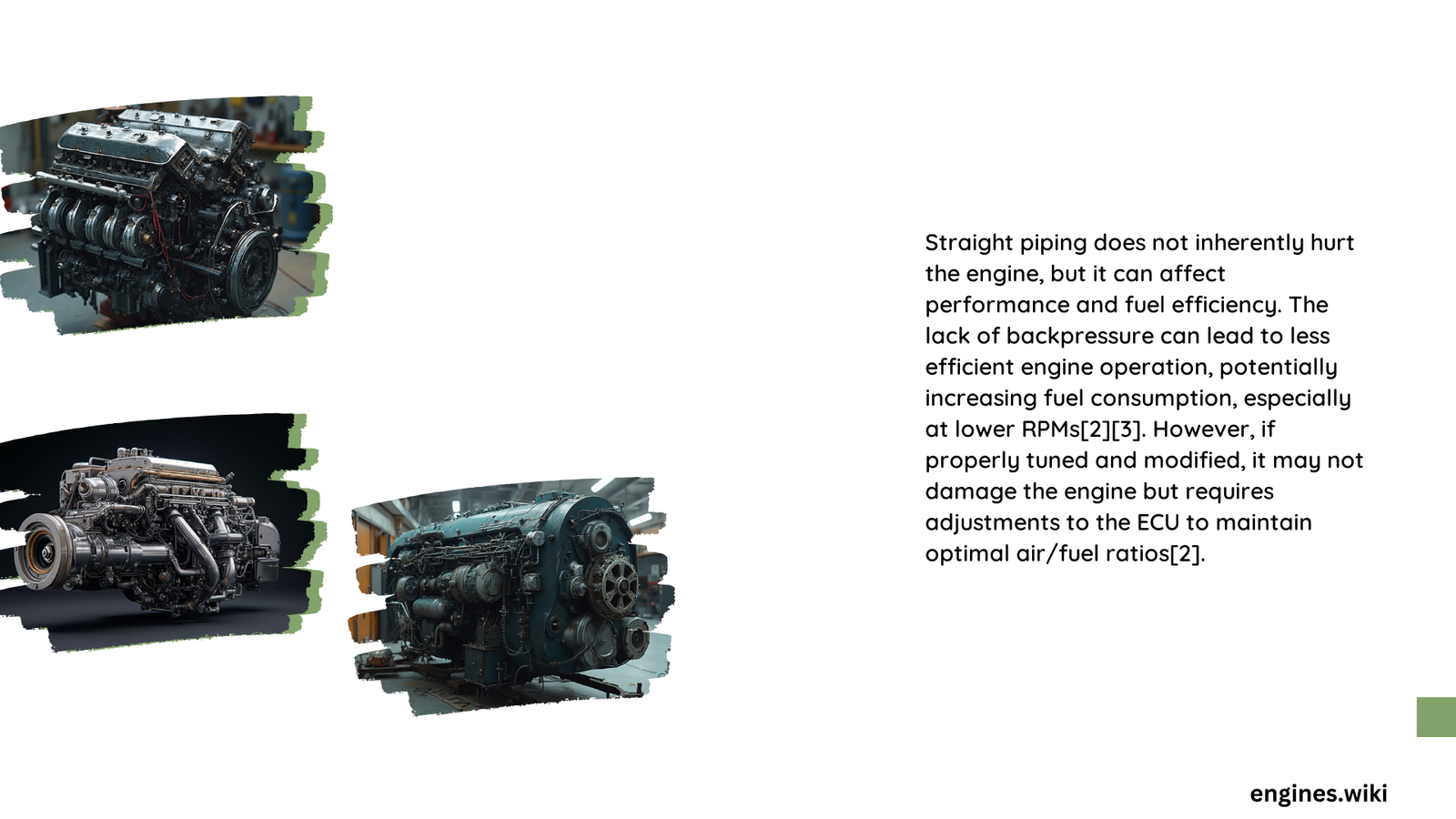Straight piping, a popular modification among car enthusiasts, involves removing mufflers, catalytic converters, and resonators from the exhaust system. While it’s known for enhancing vehicle sound and potentially improving performance, many wonder about its impact on engine health. This article explores the effects of straight piping on engines, addressing concerns about potential damage, performance changes, and long-term implications.
What is the Impact of Straight Piping on Engine Longevity?
Contrary to common misconceptions, straight piping does not inherently cause mechanical damage to engines. The primary concerns revolve around:
- Back Pressure: Often misunderstood, reducing back pressure through straight piping doesn’t negatively impact engine longevity. In fact, it can improve exhaust flow and potentially increase power output.
- Engine Performance: No direct evidence suggests that straight piping damages the engine. However, improper installation or incorrect pipe sizing can lead to:
- Poor engine performance
- Decreased fuel economy
- Stalling issues
- Problems starting the engine
It’s crucial to note that while the engine itself may not be directly harmed, other aspects of vehicle operation and compliance can be significantly affected.
How Does Straight Piping Affect Engine Performance?

Straight piping can have both positive and negative effects on engine performance:
Potential Benefits:
- Reduced back pressure
- Increased power gains
- Improved fuel economy in some applications
- Enhanced engine responsiveness
Possible Drawbacks:
- Inconsistent performance improvements
- Potential loss of low-end torque
- Risk of running too lean without proper tuning
| Aspect | Potential Impact |
|---|---|
| Horsepower | Slight increase, especially in modified vehicles |
| Torque | Possible gain, varies by vehicle and modification |
| Fuel Economy | May improve due to reduced back pressure, but often offset by aggressive driving |
What Are the Legal and Environmental Consequences of Straight Piping?
While straight piping may offer performance benefits, it comes with significant legal and environmental risks:
- Emissions Increase:
- Removal of catalytic converter leads to higher emissions of harmful pollutants
-
Contributes to environmental issues like smog and ozone damage
-
Legal Issues:
- Illegal for vehicles on public roads in many jurisdictions
-
Violations can result in fines up to $10,000 or more
-
Noise Pollution:
- Significantly louder exhaust noise
- Can lead to noise complaints and legal troubles
How Does Straight Piping Impact Vehicle Maintenance?
Straight piping can affect vehicle maintenance in several ways:
- Exhaust System Components:
- Primary impact on exhaust system rather than engine itself
-
Potential for increased vibrations and noise
-
Maintenance Costs:
- Possible increase due to more frequent inspections
-
Potential repairs related to emissions and noise issues
-
Specific Concerns:
- Need for regular checks for exhaust leaks
- Monitoring of exhaust system integrity due to increased stress
What Are the Pros and Cons of Straight Piping?
Pros:
- Enhanced exhaust sound
- Potential slight performance increase
- Minor weight reduction
Cons:
- Legal issues in many jurisdictions
- Increased emissions and environmental impact
- Potential for decreased low-end torque
- Risk of failing emissions tests
- Possible decrease in vehicle resale value
Is Straight Piping Worth the Risks?
Considering the potential benefits against the legal, environmental, and maintenance implications:
- Performance Enthusiasts:
- May find the sound and slight performance gains appealing
-
Must weigh benefits against legal and environmental concerns
-
Daily Drivers:
-
Generally not recommended due to legal issues and potential for increased maintenance
-
Track-Only Vehicles:
- May benefit from straight piping without facing legal road use issues
- Still need to consider track-specific noise regulations
What Are Alternative Exhaust Modifications?
For those seeking performance gains without the drawbacks of straight piping:
- High-Flow Catalytic Converters:
- Reduce emissions while improving exhaust flow
-
Maintain legal compliance
-
Performance Mufflers:
- Enhance sound without completely eliminating noise reduction
-
Often provide a balance between performance and legality
-
Cat-Back Exhaust Systems:
- Improve exhaust flow from the catalytic converter back
- Typically legal and offer moderate performance gains
In conclusion, while straight piping doesn’t directly hurt the engine, it comes with significant legal, environmental, and practical considerations. Car enthusiasts should carefully weigh these factors against the potential benefits before deciding on this modification.
References:
1. Ford F150 Forum: Will straight pipes damage my engine?
2. 9th Gen Civic Forum: Warning: What you need to know about \”straight pipe\” your Civic
3. CarFromJapan: Everything You Need To Know About Straight Pipe Exhaust
4. Motor Verso: Does Straight Piping Hurt Your Engine?
5. Vehicle Freak: Does Straight Piping Hurt Your Engine?
